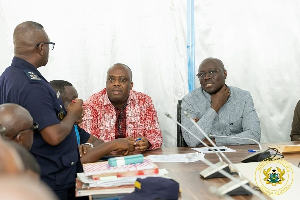Bolgatanga, Nov. 5, GNA - Dr Koku Awoonor-Williams, the Upper East Regional Director of Health Services, on Friday said the pace and quantum of reduction in maternal mortality and neo natal deaths was inadequate for the attainment of Millennium Development Goals Five by 2015 despites progress made in relation to past trends.
He said child mortality reduction rates that showed significant reduction trends had stagnated since 1990, pegging neonatal rates at 43 per 1,000 live births (LBs), infant mortality rates at 64 per 1,000 LBs and under five mortality rates at 111 per 1,000 LBs nationwide. He said this was happening because health services were not reaching the poor and vulnerable and nearly 90 per cent of health professionals were located in urban areas.
Dr Awoonor-Williams said this during the Upper East at 50 public Lectures on the theme, "Addressing the unacceptable High Maternal and Neonatal Deaths in the Upper East region for achieving the Millennium Development Goals (MDGs 4 and 5): The Cultural Perspective". He said at 50 years, the Region's maternal mortality stood at 1.53 per 1,000 live births adding that in 2009 the region recorded 80 institutional neonatal deaths as well as 122 institutional infant deaths.
"This of course represents to my estimation gross under reporting basically due to data management challenges especially at collection points" he said.
Dr Awoonor-Williams said certain cultural norms and beliefs prevented women from seeking professional health service and rather patronise unapproved herbal treatment and spiritual healing. He said the number of women who patronise family planning services was low, adding that many women taking up those services did so discreetly to prevent their husbands from knowing.
"No woman should die giving life," Dr Awoonor-Williams said and called for individual and collective commitments to doing simple and cost effective things related to maternal, child, reproductive and general health.
He appealed to district assemblies to support communities in the Region with innovative ways in managing all health emergencies by focusing on transport arrangements adaptable to the terrain to complement the existing national and family-based ambulance and referral services. 05 Nov 10
Health News of Friday, 5 November 2010
Source: GNA












